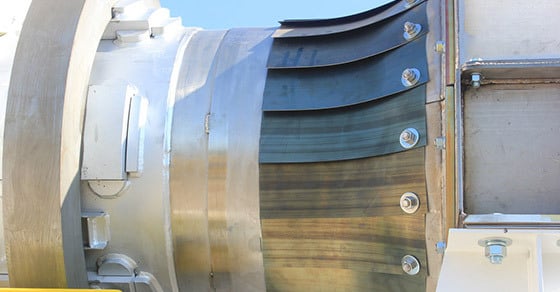When working with a rotary dryer or kiln, the sealing mechanism is a critical component in the overall performance of the unit.
Sealing mechanisms create a seal between the rotating drum and the stationary housing, preventing air or process gas from leaking into the system.
A properly functioning seal is important to maintain process efficiency; knowing when a seal is in need of repair or replacement will go a long way in keeping a process running as designed.
Why Seal Performance is Important
Rotary dryers and kilns are designed around specific process parameters that must be met in order to produce the desired product quality efficiently. Since both units employ high temperatures to process material, be it for removing moisture or to cause a chemical reaction, maintaining the necessary temperatures, and in some cases, the processing atmosphere, is essential. Seals, available in many kinds depending on the level of acceptable leakage, are the mechanism that allows the intended processing environment and temperature to be maintained.
As such, a worn or damaged seal can greatly impact process performance. Air leaking into the rotary unit will cause the internal temperature to deviate, which causes the process to decrease in efficiency, sometimes significantly. This often results in increased fuel consumption and may even decrease overall throughput.
This is particularly true of rotary kilns, where the atmosphere inside the kiln must be tightly controlled to achieve the desired chemical reaction or physical change. Air leaking into the system has the potential to change process conditions, therefore disrupting the intended reaction.
For these reasons, when a seal is not performing properly, replacing that seal may offer the following benefits:
- Improved process efficiency
- Increased capacity
- Reduced fuel consumption
Signs that a Seal is Not Functioning Properly
Determining whether a seal is, or will soon be in need of replacement is often as simple as a visual inspection. Examining the seal on a weekly basis can help to indicate that a seal is wearing and may soon require repair or replacement. Signs that a seal is in need of attention include:
- Visible wear on seals, such as missing, worn, or drooping seal leaves
- Signs of material back spill, or material exiting the rotary unit through the seal (Note: as seals are not designed to contain material, the presence of material in the seal area could be an indication of other underlying issues)
- Abnormal auditory cues such as chattering or vibration
In addition to these indicators, unexplained process inefficiencies may also be a sign that a seal is not performing as intended.
What a Seal Replacement Looks Like
Various factors can impact the life of a seal, including:
- Process Uptime
- Internal and External Temperatures
- Drum Speed (RPMs)
- Drum Size
- Material Being Processed
- Positive Pressure Operation
- Processing Atmosphere (corrosiveness of material or gases; abrasiveness of material)
Additionally, a seal that is wearing frequently could indicate an underlying process or mechanical issue.
Once it is determined that a seal replacement is needed, FEECO Customer Service Engineers can help to select the appropriate replacement seal for the job, with various seal options available. Engineers will ask for a variety of process and equipment parameters to provide a seal that meets exact process specifications and will perform optimally.
In addition to providing replacement seals, FEECO can also repair or replace the seal, which may be an option in cases of minor wear.
If you suspect that your rotary dryer or kiln may not be performing as intended, FEECO Customer Service Engineers can travel to your site and conduct an audit. Seals are just one of the many components examined by FEECO Customer Service Engineers as part of a process or equipment audit.
FEECO has been providing custom rotary equipment since 1951. We provide a range of parts and service support and spare parts for all of your rotary drum needs, including seals. For more information on replacement seals, or to schedule an equipment or process audit, contact us today!



